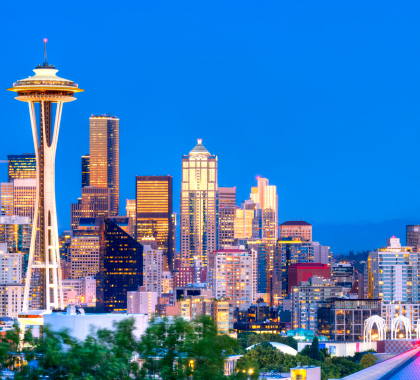This November, Washington could become the first state to impose a tax on carbon dioxide emissions, and the first government anywhere to impose the tax through a direct popular vote.
Having rejected a ballot initiative proposing a tax on carbon dioxide emissions just two years ago, Washington voters will decide the fate of a newly proposed statewide carbon dioxide tax during this November’s midterm elections.
In contrast to California’s “cap and trade” scheme, which allows emitters to buy and sell unused credits for reducing emissions, Washington state’s Initiative 1631, like the rejected 2016 proposal, would impose a tax on emissions of carbon dioxide, methane, and other greenhouse gases emitted by select utilities and manufacturers and through transportation.
Prior Carbon Taxes Rejected
The measure rejected by Washington voters in 2016 would have imposed a supposedly revenue-neutral tax on carbon dioxide emissions, with the revenue raised returned to businesses and individual taxpayers through reductions in various state taxes.
The Audubon Society was the only major environmental group to actively support the 2016 carbon tax initiative.
National and local environmental organizations also opposed legislation proposed by Gov. Jay Inslee (D) in early 2018 to impose a tax on carbon dioxide emissions and send the revenues to the state’s general fund.
Price Hikes Projected
Unlike 2016’s effort and Inslee’s proposal, the current carbon dioxide tax initiative has widespread support within the environmental community, including the Natural Resources Defense Council, the Sierra Club—which actively opposed the 2016 initiative—and the Union of Concerned Scientists. The current initiative would send the tax revenue to environmental projects these organizations have pushed.
Initiative 1631 would impose a tax of $15 per metric ton on industrial, commercial, and transportation-related emissions of carbon dioxide. The tax would rise by $2 per ton each year until the state met its goal of reducing emissions 50 percent below 1990 levels by 2050. If the state failed to meet its targets for 2035 and 2050, the oversight board could continue increasing the fee indefinitely.
Washington state has projected the carbon dioxide tax would generate an estimated $2.2 billion in the first five years, with gasoline prices likely to rise by 13 cents a gallon and home heating oil costs rising by 15 cents a gallon in 2020, the year the tax would take effect.
Revenue for Environmental Causes
Technically, the proposed imposition is a fee under state law, because the revenue would not be returned to taxpayers or go to fund general state operations. Instead, under the initiative a board would be created to spend the revenue on a variety of “clean energy” projects, mass transit, and so-called environmental justice programs.
Environmental groups have lined up in support of the present carbon tax initiative because they would largely control how the revenue is spent, says Todd Myers, environment director at the Washington Policy Center and a policy advisor to The Heartland Institute, which publishes Environment & Climate News.
“Increasing taxes to fund government expansion is central to their approach,” said Myers.
‘Special-Interest Payoffs’
Initiative 1631 exempts from the tax some of the state’s largest private employers: airplane manufacturers, such as Boeing; Alcoa aluminum; pulp and paper mills; and the Centralia coal-powered electricity plant, companies which produce approximately 20 percent of the state’s carbon dioxide emissions.
Myers says the exemptions, intended to prevent these industries from actively opposing the carbon tax, among other factors, would undermine its effectiveness.
“The ostensible aim of a carbon tax is to reduce emissions of carbon dioxide, methane, and other greenhouse gases, yet it is clear I-1631 contains a number of special-interest payoffs,” Myers said. “Since 2007, British Columbia, the Canadian province next door to Washington state, has had a carbon tax roughly twice as large as that proposed in Washington, yet it has only reduced emissions by 2 percent.
“In Washington, where most of our electricity comes from hydro, nuclear, and wind, our electricity is mostly carbon-free already,” said Myers. “So, even if we went to a 100 percent renewable mandate, there isn’t much CO2 reduction to be gained. It would just raise costs with little benefit.”
Joe Barnett ([email protected]) writes from Dallas, Texas.





